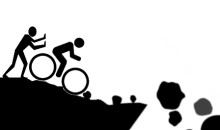
At a Bahá‘í retreat on Conversations on the Way: Kindling Hope in a Time of Despair, the conversation following a presentation on the environmental crisis turned to the notion of hastening the collapse of the old world order. There is a thesis out there, amongst some Bahá‘ís and in parts of the Christian community, that environmental destruction is a signpost on the way to a better world; it is seen as a crucial element of the retributive calamity that ushers in the promised day of God.
Then it follow, so some say, that we should not try to stem the tide of climate change, of ecosystem degradation, of the loss of biodiversity. Moreover, why should we not actively work to bring about that collapse by purposefully over consuming — so that the day of reckoning, when we must transcend our baser natures in order to survive (or achieve the rapture, in another theology), will arrive that much sooner?
One of the participants had a particularly beautiful response, something like this… If we are teaching a child to ride a bicycle, we know the child is likely to fall and experience pain. We lovingly instruct the child, instructing her as best we can. We prepare for a fall — we have the Band Aid and ointment and kisses ready to begin the healing. In our eagerness to have this child experience reality and get back on the bike, why not give an extra hard push down the hill, thereby insuring the fall?
Because it would, quite simply, be cruel, and a loving parent could never (one hopes) actively try to cause harm for their child! Likewise, there is nothing godly about trying to hasten the “end times” through our knowing destruction of our natural resources, through knowing abandonment of the stewardship entrusted to us in the Book of Genesis.
For me, it is a matter of justice — we must manifest justice today, not just in that future for which we eagerly await. In manifesting justice, we must be concerned with the well being of those who, today suffer due to pollution, rising seas, etc., of those who will suffer in the near future while our vaunted civilization is still unfolding, and of those who will suffer in that future from the material impoverishment that we are creating today. Otherwise, what does it mean to “love your neighbor as yourself,” as Christ instructs us? Was that statement somehow limited in scope and I just missed it?
In a letter to the Bahá‘ís of the world, Shoghi Effendi, who was leader (“the Guardian”) of that Faith from 1921 until 1957, wrote in terms that will be familiar to many in the Christian world, describing a “tempest, unprecedented in its violence, unpredictable in its course, catastrophic in its immediate effects, unimaginably glorious in its ultimate consequences” that is “sweeping the face of the earth” [emphasis added]. Further, he quotes Bahá‘u’lláh as saying that “The day is approaching when its [civilization’s] flame will devour the cities, when the Tongue of Grandeur will proclaim: ‘The Kingdom is God’s, the Almighty, the All-Praised!’,” among other similar “end times” type statements. And yet he found this to be a call to our higher selves, not our lower selves, writing that even as we should “acknowledge the necessity” of this “titanic upheaval,” we should also “ardently pray for the mitigation of its severity, intelligently labor to assuage its fury, and anticipate, with undimmed vision, the consummation of the fears and the hopes it must necessarily engender.”† For Shoghi Effendi, apparently, there was no doubt that we must ameliorate the present conditions of the world, and so to should it be for the Bahá’ís.
Thankfully that small band of believers are not alone: among other groups and venues, the Interfaith Power & Light “movement” proves that we can come to this conclusion — that our worship of God requires amelioration of deadly climate conditions created by humanity — from literally all backgrounds. Rather than hasten the collapse, let us work across all divisions to “assuage its fury” and hasten the integration of civilizations.
† Shoghi Effendi, The Promised Day is Come, US Bahá‘í Publishing Trust, 1980 revised edition, from pages 2, 3, and 4. http://reference.bahai.org/en/t/se/PDC/pdc-2.html
Posted with : Social Discourse, On the Subject of Religion